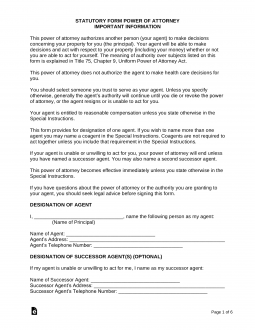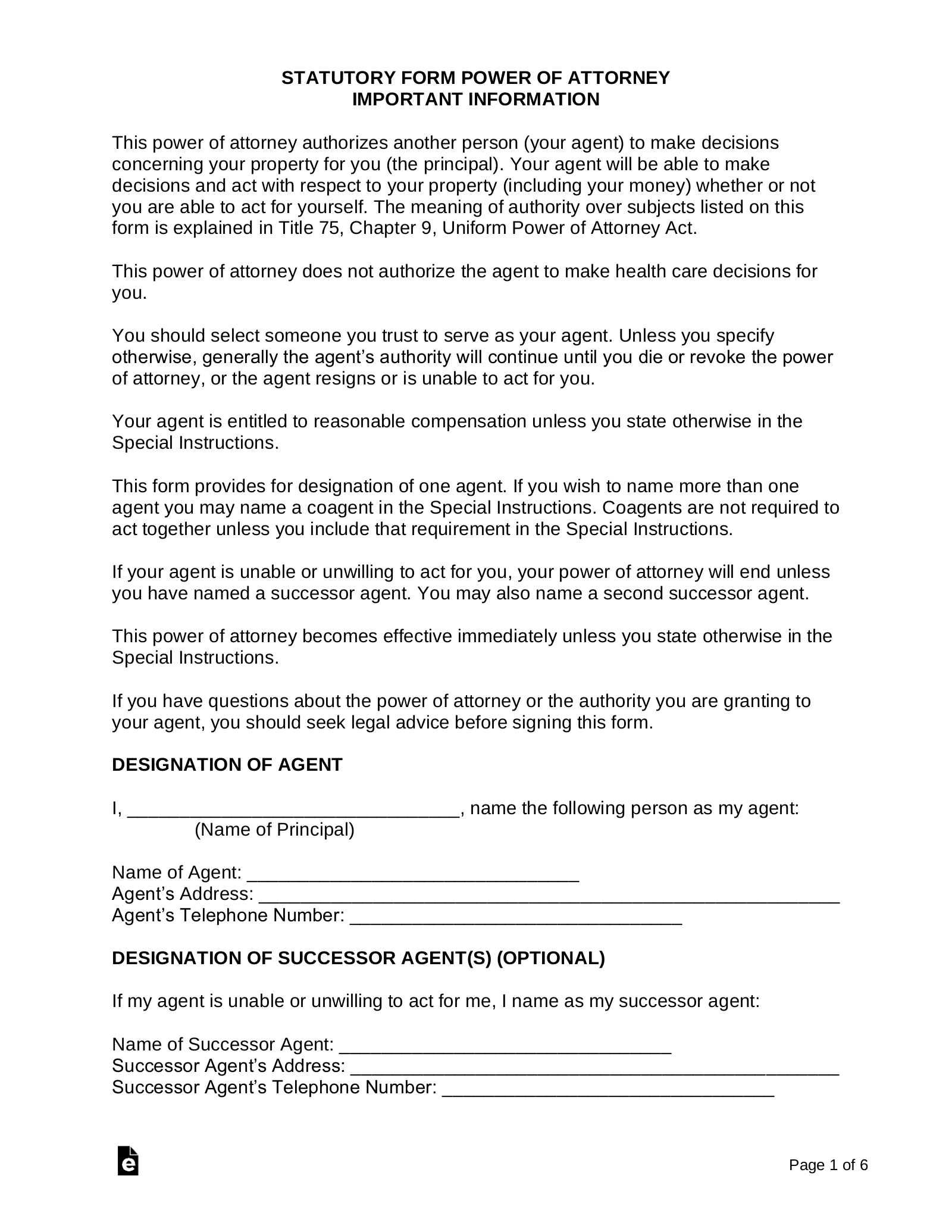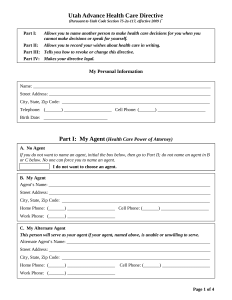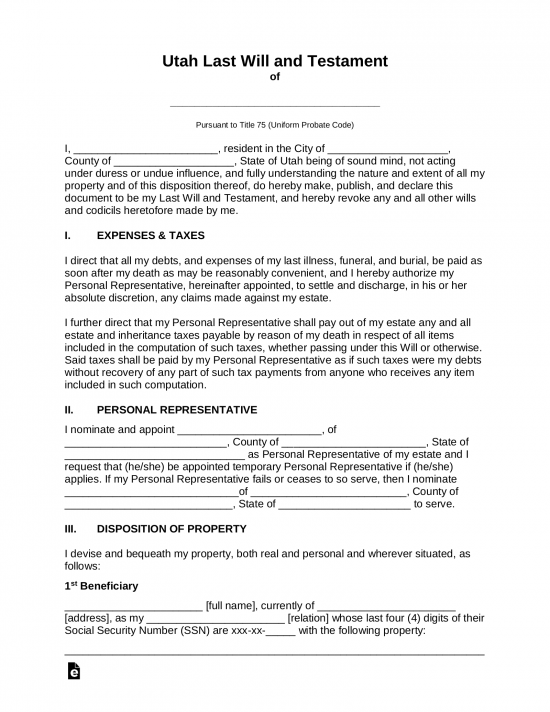Updated October 11, 2023
A Utah durable statutory power of attorney form lets a person select an agent to represent their best interests and handle their financial affairs during their lifetime. The person giving power (“principal”) will be able to transfer all financial-related responsibility to the agent as if they can do it themselves. Therefore, it is suggested the only people eligible to be an agent are highly trusted people such as a spouse or a close family member.
Versions (2)
 Standard Statutory Durable Power of Attorney Form
Standard Statutory Durable Power of Attorney Form
Download: PDF, MS Word, OpenDocument
 UTCourts.gov Statutory Durable Power of Attorney Form
UTCourts.gov Statutory Durable Power of Attorney Form
Download: PDF
Table of Contents |
Laws
Title 75, Chapter 9 (Uniform Power of Attorney Act)
Definition of “Durable”
“Durable,” with respect to a power of attorney, means not terminated by the principal’s incapacity (§ 75-9-1052(2)).
Definition of Power of Attorney
“Power of attorney” means a writing or other record that grants authority to an agent to act in the place of the principal, whether or not the term power of attorney is used (§ 75-9-1052(7)).
Signing Requirements
The principal must sign in the presence of a notary public. (§ 75-9-105.)
Statutory Form
The statutory version of Utah’s durable power of attorney can be located at UT code § 75-9-301.
How to Write
Download: PDF, MS Word, OpenDocument
1 – Obtain The Utah Durable Power of Attorney
This template may be opened using the PDF button below the image. You may enter it directly onscreen using a form friendly browser or a compatible program. If desired, you may also download this form and work on it at your discretion.
2 – Agent Designation
The first section, “Designation of Agent,” will provide the framework to report the Principal’s Agent Information. The Principal is the individual who will grant another Power in his or her affairs, while the Agent is the individual who will accept this Power and Responsibility.
On the first blank line below the heading, report the Full Name of the Principal.
The next area of this section will provide a blank line for the “Agent’s Name,” “Agent’s Address,” and “Agent’s Telephone. Number.” Make sure the information reported here includes the Agent’s Physical Residential Address and Daytime Telephone Number.
Below this, the Principal may name up to two Successor Agents. The first Successor Agent is the person who shall assume the responsibility and authority designated to the Primary Agent if he or she will not fulfill this role. Report the Name, Address, and Telephone Number of the Successor Agent on the blank lines labeled “Name of Successor Agent,” “Successor Agent’s Address,” and “Successor Agent’s Telephone number.” The first two entries may be made at the bottom of this page.
The Successor Agent’s Telephone Number must be presented at the top of the next page![]()
The Second Successor Agent is the individual who will step into the Primary Agent’s role if both the Primary Agent and First Successor Agent will not be able to live up to this role. The next three blank lines “Name of Successor Agent,” “Second Successor Agent’s Address,” and “Second Successor Agent’s Telephone Number” requires the Name, Address, and Telephone Number of the Second Successor Agent.
3 – Granting Authority In Specific Areas
The next portion of this form will provide a list of subjects of Authority. The Principal must go through this list, then initial each subject the Agent will be granted power in. Any subject not initialed by the Principal will not be subject to the Agent’s Principal Authority. As a matter of convenience, if the Principal wishes to grant the Agent authority over all of these lists, he or she need only initial the last subject of authority.
The Principal must initial the space between the brackets in the first subject of authority to grant the Agent power regarding his or her Real Property.
If the Principal intends to designate his or her Authority to the Agent over the Principal’s Tangible Personal Property, the second subject of authority must be initialed by the Principal.
The Agent will be given power over the Principal’s Stocks and Bonds, once the third subject of authority is initialed by the Principal.
The fourth subject of authority should be initialed by the Principal, if he or she wishes to appoint the Agent with power in the matters of the Principal’s Commodities and Options
The Agent will be designated with authority regarding the Principal’s Banks and Other Financial Institutions when the Principal initials the fifth subject.
The Agent will have Principal Power over the Principal’s Operation of his or her Business Entity, if the Principal initials the sixth subject
If the Principal wishes to designate the Agent with authority in his or her Insurance and Annuities, then he or she must initial the seventh subject.
The Principal will appoint the Agent with Principal Authority regarding his or her Estates, Trusts, and Other Beneficial Interests by initialing the eighth subject.
The Agent will have power over the Principal’s Claims and Litigation when the Principal initials the ninth subject of authority. 
The Principal must initial the tenth subject of authority to give the Agent power over his or her Personal and Family Maintenance.
If the Agent will be expected to use Principal Authority regarding the Principal’s Benefits from Government Programs, Civil Service, or Military Service, the eleventh subject of authority must bear the Principal’s Initials.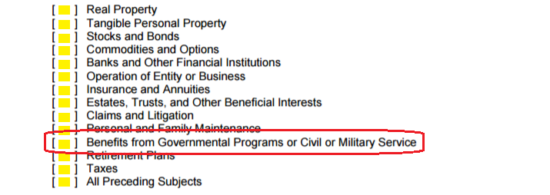
The Agent will have Principal Authority regarding the Principal’s Retirement Plans, once the Principal initials the twelfth subject.
The Principal will give the Agent approval to use his or her Authority regarding Taxes by initialing the thirteenth subject.
The Principal may initial the last subject of authority to grant the Agent Authority in all of the previous matters.
4 – The Specific Authority
The Principal may choose to designate or detail certain specific actions to the Agent through this document. While this is optional, some would consider it wise to do so initially rather later down the line. An Agent appointed with any power a Principal possesses may have some very dramatic effects in those areas. As with the previous segment of this form, the Principal must initial the space between the two brackets preceding the Action(s) he or she wishes to appoint the Agent.
If the designated Agent may Create, Alter, Revoke or Terminate an inter vivos trust on behalf of the Principal, the first action must be initialed by the Principal.![]()
The Principal should initial the second action if he or she will allow the Agent to make a Gift (within the limits allowed by law and this paperwork).
The right to create or change Rights of Survivorship on behalf of the Principal will be granted to the Agent if the Principal initials the fourth action.
The Agent will be able to wield Principal Power in creating or changing Beneficiary Designation, if the Principal initials the fifth action.
If the Principal intends to grant the Agent the Power to Authorize another person to wield the Principal Powers defined in this document, the sixth action will need to be initialed by the Principal.
If the Agent should have the power to waive the Principal’s right to be a beneficiary of a joint and survivor annuity
The ability to exercise the all the Principal’s Fiduciary Powers the Principal may delegate will be granted to the Agent once the Principal initials the eight action.
The Agent will have the right to Disclaim or Refuse an Interest in Property on behalf of the Principal, if the Principal initials the last item.
5 – Additional Principal Instructions
Another optional section of this form will provide a potentially useful area where the Principal may specifically define and issue instructions directly to all parties involved. Locate the section titled “Special Instructions (Optional).” If the Principal wishes to add anything to this document relating to the Agent(s), Powers Granted, Term, Relevant Institutions, etc., they may be documented using the blank lines in this section.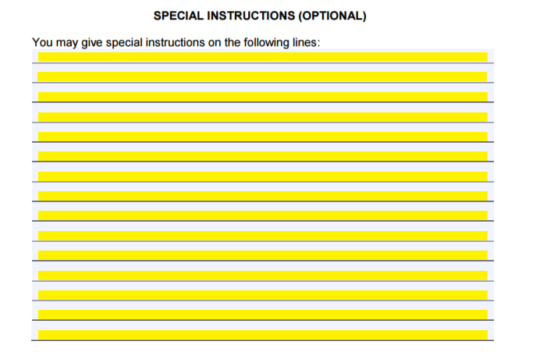
6 – The Conservator or Guardian Option
In some case, the court may have to appoint a conservator of the Principal’s Estate or even a Guardian of the Principal. While each of these would require their own paperwork to be satisfied the Principal may use this form to Name a Nominee for either or both of these roles below the heading “Nomination of Conservator Or Guardian (Optional)”
If the Principal wishes to Nominate someone to be the Conservator of his or her estate should that ever be necessary, then record the Name of the Nominee on the blank line “Name of Nominee For Conservator Of My Estate.” This should be followed with the Nominee’s Address and Telephone Number entered on the two lines below the Name.
If the Principal would prefer a specific individual to act as his or her Guardian, the name of the Nominee should be recorded on the blank space after the words “Name of Nominee For Guardian Of My Person.” The next line should bear this individual’s Address and the last line should have the Nominee’s Telephone Number. Make sure the contact information here is a reliable way of reaching this entity quickly.
7 – The Principal’s Required Signature And Acknowledgment
Due to the nature of this paperwork and the impact its execution may have on a Principal’s life, its mandates must be authenticated by the issuing Principal. This will be done through the Principal’s Signature which should be notarized.
The Principal must sign the line labeled “Your Signature.”
On the line following the word “Date,” the Principal must enter the Date he or she is signing this document (at the time of signing).
The Principal’s Full Printed Name, Complete Address, and Telephone Number must be recorded directly below this.
Finally, the Principal must verify the Signature Date on the blank line just above the word Date, Sign his or her Name after the words “Sign Here,” and Print his or her Name below the Signature.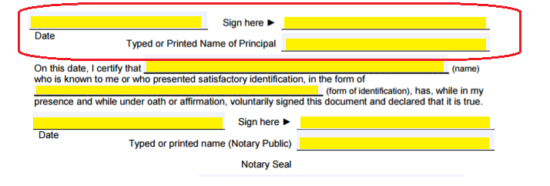
The Notary Public present at the time of this signing will provide the next section with the information and seal it requires. No other entity may satisfy the statement beginning with the words “On this date…”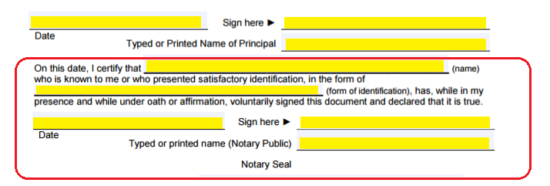
Finally, the Preparer of this document must self-report his or her Identity on the blank line next to the words “This document was prepared by”![]()
As a means to make sure the Agent understands his or her role, there are a few paragraphs this entity should read at the end of this form.
Related Forms
Download: PDF

